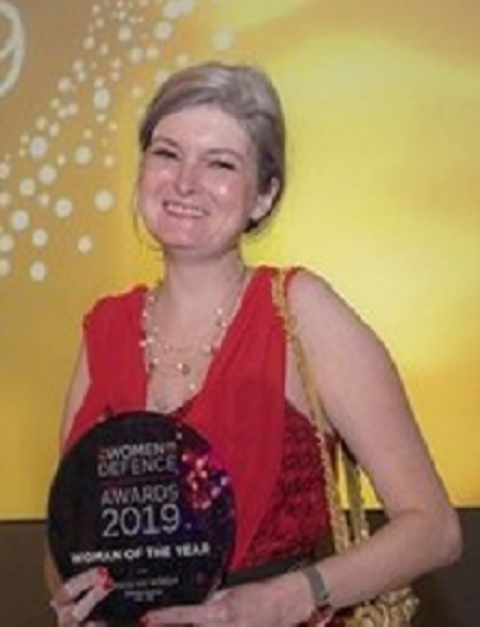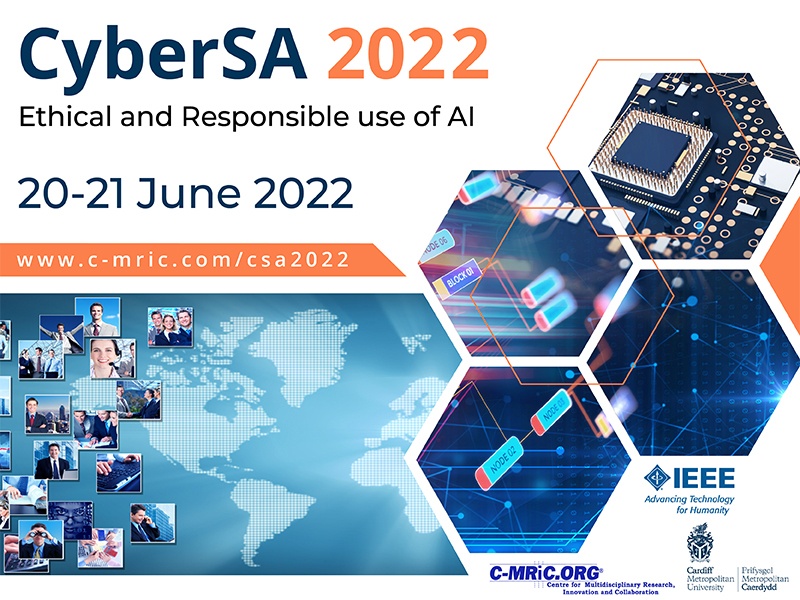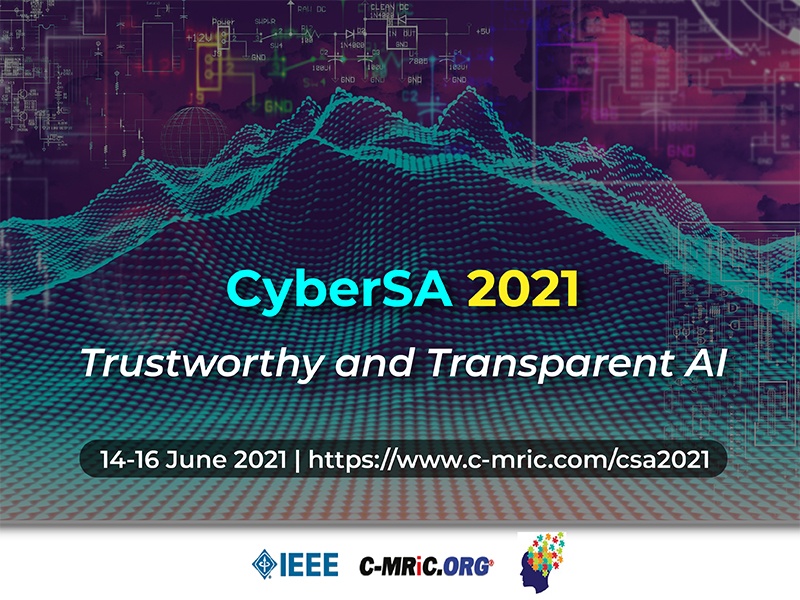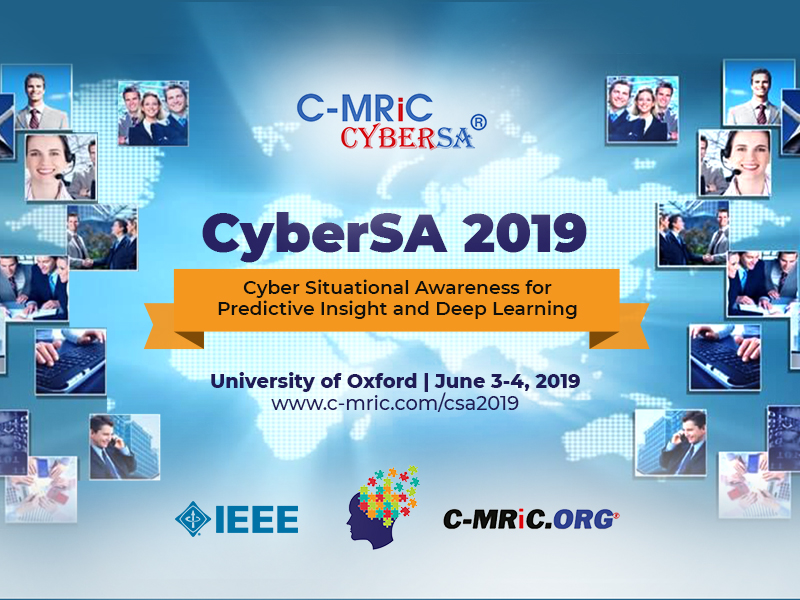
Theme – Machine Learning for insight in Cyber Security and Situational Awareness.
Conference will be held online / virtual due to COVID19
Download Conference Programme
Download Conference Timetable
June 15 – 19, 2020
Call for Papers
IEEE is the Technical Co-Sponsor (TCS) of the International Conference on Cyber Situational Awareness, Data Analytics and Assessment (CyberSA 2020), an international refereed conference dedicated to the advancement of the principles, methods and applications of situation awareness on Cyber Systems, Business Information Systems (BIS), Computer Network Defence (CND), Critical National Infrastructures (CNI), Cyber Physical Systems (CPS) and Internet of Things (IoTs).
The aim of the CyberSA 2020 is to encourage participation and promotion of collaborative scientific, industrial and academic inter-workings among individual researchers, practitioners, members of existing associations, academia, standardisation bodies, and including government departments and agencies. The purpose is to build bridges between academia and industry, and to encourage interplay of different cultures.
CyberSA 2020 invites researchers and industry practitioners to submit papers that encompass principles, analysis, design, methods and applications. All submitted papers are independently peer-reviewed. It is open to the public, so you can attend the event without presenting a paper. Registration for both authors and attendees (without presenting a paper) opens in March 2020. You are welcome!
The conference proceedings will be submitted for consideration for publishing and listing on the following bibliographic indexes:
- IEEE Computer Society Digital Library
- IEEE Xplore Digital Library
- DBLP Computer Science
- Others – Scopus, CiteSeerX, Computer Science Index, EI Compendex, Academic Search Complete, CiteULike, Google Scholar & Microsoft Academic Search.
The organisers will accept registration of up to 5 IEEE UK&I Student and YP Members at 75% discounted rate, and will offer up to 20% registration discounts for all IEEE, BCS, IET & IISP members.
Details
CyberSA 2020, in conjunction with the International Workshop on Cyber Insurance and Risk Controls (CIRC 2020), is co-located with other conferences as part of Cyber Science 2020.
- Workshop on Cyber Insurance and Risk Controls (CIRC 2020) will be presented at the conference.
- Posters & Presentations will be presented at the conference.
- Industry track is available for discussing and publishing pilot and proof of concepts.
- Work in Progress track is available for preliminary work.
- Research Ideas track is available for ideas in early stages assessment.
- PhD Seminar track is available for discussing and publishing early PhD thesis research.
Paper Submission
The deadline for all paper submissions, that is, both full papers and extended abstracts for Poster, WIP, PoC, Research Idea and PhD Seminar presentations was 26th January 2020, but now the deadline for all submissions has been extended to 6th March 2020.
All Industry track, Work in Progress track, Research Ideas track and PhD Seminar track will be published in the conference proceedings. Interested participants, please submit your proposal using the online submission system hosted by Easychair Conference Portal.
Full paper submission should be via Easychair Conference Portal.
Online Submission
The online submission process is now open!
Please prepare your paper according to the formatting guidelines (Word document/PDF template/LaTeX). Use the IEEE A4 paper type. Please note that it’ll be IEEE e-copyright, which must be completed for all accepted papers. We’ll send authors’ of accepted papers instruction on how to complete an IEEE e-copyright form.
Authors must use the online submission systems hosted by EasyChair Conference System to submit their papers. Please use/download the IEEE A4 paper template, and specify which conference your submission is to. If you don’t have an EasyChair account you will need to create one and then login in order to submit your papers. Please read the Submission Instructions before submitting your work in the system.
Submission Instructions
Both long (8 pages max., roughly 8,000 words) and short (4 pages max., roughly 4,000 words) paper submissions should be written in English and be submitted electronically via the EasyChair conference portal. Submission file formats are PDF and Microsoft Word using the IEEE A4 Paper template that can be found at the corresponding C-MRiC website. Authors wishing to present a Poster, Industry Proof of Concept (PoC), Work in Progress (WIP), Research Ideas, or PhD Seminar may submit a 2‐page extended abstract using the online submission systems hosted by EasyChair Conference System, which, if accepted, will appear in the conference proceedings.
Topics of Interest
- Situation Awareness in Software Defined Networks
- Security Monitoring, Scale of Things and Limits to Monitoring
- Block Chain Technology in Security
- IoT Detection and Software Driven Applications Security
- Situation Awareness in Mobile Computing
- Standardisation of Cyber Situation Awareness
- Search, Triage, Examination and Forensics in Cloud Computing
- Cyber SA in Chaotic Computing
- Cyber SA in Large Scale IDS Deployments
- Cyber SA in Deep Learning
- Cyber SA in Deep Analytics
- Machine Learning for Cyber Situational Awareness
- Assessment models and methodologies for Cyber SA
- Cyber Situation Awareness Evaluation Recommendation
- Cyber SA Maturity Models and Frameworks
- Cyber SA for Social Networks
- Social Network Interaction and Intelligence
- Web Analytics & Security Incident Response
- Organised and collaborative Maps and Networks
- Cyber Behavioural Analytics and Profiling
- Collaborative Situation Awareness for Decision Making
- Situation Assessment & Decision Making
- Defense Strategy for the Enhancement of Situation Awareness
- Situation Assessment, Resolution and Decision Loop
- Individual vs. Team SA
- Group and Team SA
- Trust, Privacy and Anonymity Issues
- Digital Forensic Information Analysis
- Enterprise Information Security Policies, Standards and Procedures
- Risks posed by Wireless Networks, including through the use of Mobile Computing, BYOD, Wearable in CND environment
- Fuzzy Logic
- Rough Set
- Artificial Neural Networks
- Artificial Intelligence
- Genetic Algorithm
- Evidence Theory (DST)
- Bayesian Networks & Set Theory
- Big Data Analytics
- Game Theory
- Graph Theory
- Cyber Attack Scenarios
- Situation-Aware and Context-Aware Network Applications
- CERTs and CSIRTs
- Security Event and Information Management
- Application Security, Audits and Penetration Testing
- Workload
- Perception
- Stress
- Knowledge
- Training and Expertise
- Risk Assessment and Decision Making
- Forecasting and Prediction
- Operator SA & Team SA
- Knowledge, Skills and Abilities (KSA)
- Information Security
- Cyber Security
- Database Security
- Application Security
- Law Enforcement and Surveillance
- Border Protection and Controls
- Cyber Warfare and Counter Terrorism
- Military Doctrinal in Situation Awareness
- C4ISR (Command, Control, Communications, Computers, Intelligence, Surveillance and Reconnaissance)
- Computer Network Operations
- Computer Network Defense
- Mission Awareness, Command and Control
- Attack Graphs
- Advanced Security Incident Analysis
- Sensor Correlation and Cross-Correlation
- Implementing Situation Awareness Systems
- Information Security Metrics and Measurements
- Proactive Defense Strategies
- Instance-Based Learning
- Adaptive Neural Logic
- Human-Assisted Decision Control
- Human in the Loop
- Automated Self-Responder
- Tools for Metric Optimisation
- Visualisation and Digital Analytics
- Data Mining
- Filtration, Selection, and Risk-Based Prioritisation
- Metrics for Evaluation and Assessment
- Usefulness of Multisensor Data Fusion
- Information Data Fusion
- Sensor Fusion for Security Incident Analysis
- Security Incident Analysis
- Data Association & Correlation
- Security Information Visualisation
- Data Analytics
- Security Monitoring
- Situation Awareness in C4ISR
- Situation Awareness in Cyber Command and Control Centres
- Situation Awareness in Intrusion Defense
- Situation Awareness in Cyber Physical Systems (CPS)
- Situation Awareness for Internet of Things (IoTs), Enterprise Internet of Things (EIoTs)
- Open Source Applications
- Functional Requirements for Situation-aware services
- Non-Functional Requirements for Situation-aware Services and solutions
- Interface Design
- Interoperability
- Dynamism
- Complexity
- Performance
- Automation
- Responsiveness
- Architecture
- Realtime Processing
- Synchronisation
- Research and development in Situation Awareness
- Simulation and Testbeds in Cyber Situation Awareness
- Experimentation & Instrumentation
- Modelling
- Knowledge-base
- Theoretical Underpinnings in Situation Awareness
- Team and Group SA
- Cyber Situation Awareness Methods, Training and Education
Speakers
Important Dates
- Industry (Proof of Concept / Pilot) Submission –
January 26, 2020extended to March 6, 2020 - Extended Abstract (Work in Progress) –
January 26, 2020extended to March 6, 2020 - PhD Seminar Submissions –
January 26, 2020extended to March 6, 2020 - Research Ideas –
January 26, 2020extended to March 6, 2020 - Poster/Demo Submissions –
January 26, 2020extended to March 6, 2020 - Special Track Submissions –
January 26, 2020extended to March 6, 2020 - Workshops and Tutorials Submission –
January 26, 2020extended to March 6, 2020 - Full Paper Submissions –
January 26, 2020extended to March 6, 2020 - Notification of Full Paper/Abstract / Special Track Acceptance/Rejection –
March 26, 2020extended to April 17, 2020 - Camera Ready Paper Due –
April 14, 2020extended to May 8, 2020 - Participants Registration – March 26 – May 31, 2020
- Conference Date – June 15 – 19, 2020
Location
Virtual / Online
Programme Committee
- Cyril Onwubiko – Centre for Multidisciplinary Research, Innovation and Collaboration, UK
- Frank Wang – Computer Society, IEEE, United Kingdom and Ireland
- Arnau Erola – Cyber Security Centre, Department of Computer Science, University of Oxford, Oxford, UK
- Theo Lynn – Dublin City University, Dublin, Ireland
- Xavier Bellekens – University of Strathclyde, Glasgow, Scotland, UK
- Theo Lynn – Dublin City University, Dublin, Ireland
- Pierangelo Rosati – Dublin City University, Dublin, Ireland
- Grace Kenny – Dublin City University, Dublin, Ireland
- Patricia Endo – Dublin City University, Dublin, Ireland
- Uri Blumenthal – MIT Lincoln Laboratory, MIT, USA
- Arnau Erola – Cyber Security Centre, Department of Computer Science, University of Oxford, Oxford, UK
- Xavier Bellekens – University of Strathclyde, Scotland, UK
- Phil Legg – University of the West of England, UK
- Kevin Curran – Faculty of Computing and Engineering, Ulster University, Northern Ireland, UK
- Arnau Erola – Department of Computer Science, University of Oxford, UK
- Hanan Yousry Hindy – School of Design and Informatics, Abertay University, Dundee, Scotland
- Ngoc Tran – Dublin City University, Dublin, Ireland
- Arnau Erola – Cyber Security Centre, Department of Computer Science, University of Oxford, Oxford, UK
- Xavier Bellekens – University of Strathclyde, Scotland, UK
- Cyril Onwubiko – Centre for Multidisciplinary Research, Innovation and Collaboration, UK
- Bertrand Venard – Audencia, OII, University of Oxford, UK
- Gerardo I. Simari – Universidad Nacional del Sur in Bahia Blanca and CONICET, Argentina
- Carlos A. Perez Delgado – School of Computing, University of Kent, UK
- Philipp Reinecke – Cardiff University, Wales, UK
- Thomas T Y Win – School of Business & Technology, University of Gloucestershire, UK
- Suleiman Yerima – Cyber Security, De Montfort University, UK
- Thomas Pasquier – Department of Computer Science, University of Bristol, UK
- Francisco J Aparicio Navarro, Cyber Technology Institute, De Montfort University, UK
- Fabio Roli – Pattern Recognition and Applications Lab, University of Cagliari, Italy
- Arnau Erola – Cyber Security Centre, University of Oxford, Oxford, UK
- Aunshul Rege – Temple University, Pennsylvania, USA
- Lynsay Shepherd – Abertay University, Scotland, UK
- Amin Hosseinian-Far – Business Systems and Operations , University of Northampton, UK
- Kevin Curran – Faculty of Computing and Engineering, Ulster University, Northern Ireland, UK
- Eliana Stavrou – Computing Department, UCLan Cyprus, Larnaca, Cyprus
- Pierre Parrend – ECAM Strasbourg-Europe, France
- Uwe Glässer – School of Computing Science, Simon Fraser University, Canada
- Jens Myrup Pedersen – University of Aalborg, Denmark
- Marios Anagnostopoulos – University of the Aegean, Greece
- Uri Blumenthal – MIT Lincoln Laboratory, MIT, USA
- Ciza Thomas – College of Engineering, India
- Stefanos Gritzalis – University of the Aegean, Greece
- Varun Dutt – Indian Institute of Technology Mandi, India
- Elisavet Konstantinou – University of the Aegean, Greece
- Panagiotis Trimintzios – Cyber Crisis Cooperation & Exercises Team Operational Security, ENISA, Europe
- Phil Legg – University of the West of England, UK
- Huiyu Zhou – Queen’s University Belfast, Belfast, UK
- Jason Nurse – University of Kent, UK
- Per Hakon Meland – SINTEF, Norway
- Martin Gilje Jaatun – University of Stavanger, Norway
- Petra Leimich – Edinburgh Napier University, Edinburgh, Scotland, UK
- Boniface K. Alese – Department of Computer Science, Federal University of Technology, Akure, Nigeria
- Ensar Seker – NATO, CCD COE, Estonia
- Ulrik Franke – Software and Systems Engineering Laboratory (SSE), RI.SE, Sweden
- Michal Chorasm – Telecommunications and Computer Science, University of Science and Technology (UTP), Bydgoszcz, Poland
- Ryan Heartfield – Cyber Security, University of Greenwich, London, UK
- Lakshmi Prayaga – Department of Applied Science, Technology and Administration, University of West Florida, USA
- Harin Sellahewa – School of Computing, The University of Buckingham, UK
- Thaddeus Eze – Computer Science Department, University of Chester, UK
- Dimitris Kavallieros – Center for Security Studies (KEMEA), Greece
- Susan Rea – Nimbus Centre at Cork Institute of Technology, Ireland
- Samir Puuska – JAMK University of Applied Sciences, Finland
- Vasil Vassilev – School of Computing, London Metropolitan University, UK
- Martin Gilje Jaatun – University of Stavanger, Norway
- Shamal Faily – Cyber Security Research group (BUCSR), Bornemouth University, UK
- Jingyue Li – Department of Computer Science, Faculty of Information Technology and Electrical Engineering, NTNU, Norway
- Hasan Yasar – Division of the Software Engineering Institute, Carnegie Mellon University, USA
Conference Programme
- Ankit Pradhan, Punith. R, Kamalakanta Sethi and Padmalochan BeraSmart Grid Data Security using Practical CP-ABE with Obfuscated Policy and Outsourcing Decryption
- Julian J. Teule, Marius F. Hensel, Victor Büttner, Jonathan V. Sørensen, Magnus Melgaard and Rasmus L. OlsenExamining the Cyber Security of a Real World Access Control Implementation
- Peter Maynard and Kieran MclaughlinBig Fish, Little Fish, Critical Infrastructure: An Analysis of Phineas Fisher and the `Hacktivist’ Threat to Critical Infrastructure
- Nicolas Pelissero, Pedro Merino Laso and John PuentesNaval cyber-physical anomaly propagation analysis based on a quality assessed graph
- Clet Boudehenn, Jean-Christophe Cexus and Abdel BoudraA Data Extraction Method for Anomaly Detection in Naval Systems
- Suleiman Yerima and Mohammed AlzaylaeeMobile Botnet Detection: A Deep Learning Approach Using Convolutional Neural Networks
- Konstantin Pozdniakov, Eduardo Alonso, Vladimir Stankovic, Kimberly Tam and Kevin JonesSmart Security Audit: Reinforcement Learning with a Deep Neural Network Approximator
- Cyril OnwubikoFocusing on the Recovery Aspects of Cyber Resilience
- Blaise Cossi Avoussoukpo, Chunxiang Xu, Marius Tchenagnon and Eltayieb NabeilTowards an Aggregate Signature-based Authentication for Opportunistic Networks
- Fiona Carroll, Phil Legg and Bastian BønkelThe Visual Design of Network Data to Enhance the Cyber Security Awareness of the Everyday Internet User
- Jordan Richard Schoenherr and Robert ThomsonBeyond the Prisoner’s Dilemma: the Social Dilemmas of Cybersecurity
- Jason R. C. Nurse, Louise Axon, Arnau Erola, Ioannis Agrafiotis, Michael Goldsmith and Sadie CreesThe Data that Drives Cyber Insurance: A Study into the Underwriting and Claims Processes
- Ulrik Franke and Joakim WernbergA survey of cyber security in the Swedish manufacturing industry
- Tal PavelCyber Insurance Market in Israel – What is the Official Policy?
- Farhad Foroughi, Hossein Hadipour and Ahmad M. ShafieeHigh-Performance Monitoring Sensors for Home Computer Users Security Profiling
- Ankit Pradhan, Venu Madhav Yatam and Padmalochan BeraSelf-Attention for Cyberbullying Detection
- Ahmed Abdulrahman Alghamdi and Giles RegerPattern Extraction for Behaviours of Multi-Stage Threats via Unsupervised Learning
- Tania Wallis and Christopher JohnsonImplementing the NIS Directive, driving cybersecurity improvements for Essential Services
- Abdulmajeed Abdullah Alahmari and Bob DuncanCybersecurity Risk Management in Small and Medium-Sized Enterprises: A Systematic Review of Recent Evidence
- Jasmina Maric5Es -> 4Cs 21st-century skills learning
- Katorah Williams, Mollie Rose Ducoste and Aunshul RegeEducating multidisciplinary undergraduates on security and privacy
- Felix Larbi Aryeh, Boniface Kayode Alese and Olayemi OlasehindeGraphical analysis of captured network packets for detection of suspicious network nodes
- Urja Pawar, Donna O’Shea, Susan Rea and Ruairi O’ReillyExplainable AI in Smart Healthcare
- Ahmet Aris and Sema F. OktugAnalysis of the RPL Version Number Attack with Multiple Attackers
- Daniel Krohmer and Hans D. SchottenDecentralized Identifier Distribution for Moving Target Defense and Beyond
- Lukas Gressl, Alexander Rech, Christian Steger, Andreas Sinnhofer and Ralph WeissneggerA Design Exploration Framework for Secure IoT-Systems
- Maicon Herverton Lino Ferreira da Silva Barros, Morgana Thalita da Silva Leite, Vanderson Sampaio, Theo Lynn and Patricia Takako EndoApplication and analysis of record linkage techniques to integrate Brazilian health databases
- Lale Madahali and Margeret HallApplication of the Benford’s law to Social bots and Information Operations activities
Related Conferences:

Social Media 2020
IEEE is the Technical Co-Sponsor (TCS) of the International Conference on Social Media, Wearable and Web Analytics (Social Media 2020).
View More
Cyber Security 2020
IEEE is the Technical Co-Sponsor (TCS) of the International Conference on Cyber Security and Protection of Digital Services (Cyber Security 2020).
View More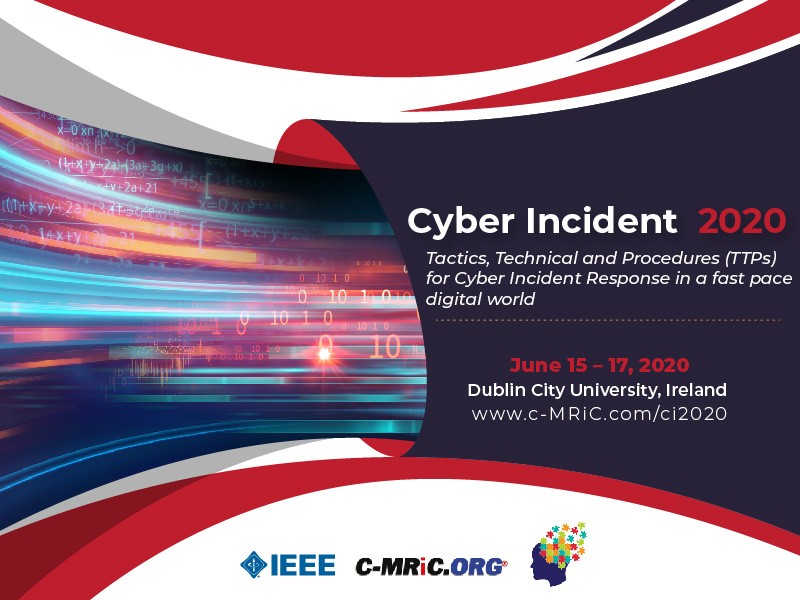
Cyber Incident 2020
IEEE is the Technical Co-Sponsor (TCS) of the International Conference on Cyber Incident Response, Coordination, Containment & Control (Cyber Incident 2020).
View More


